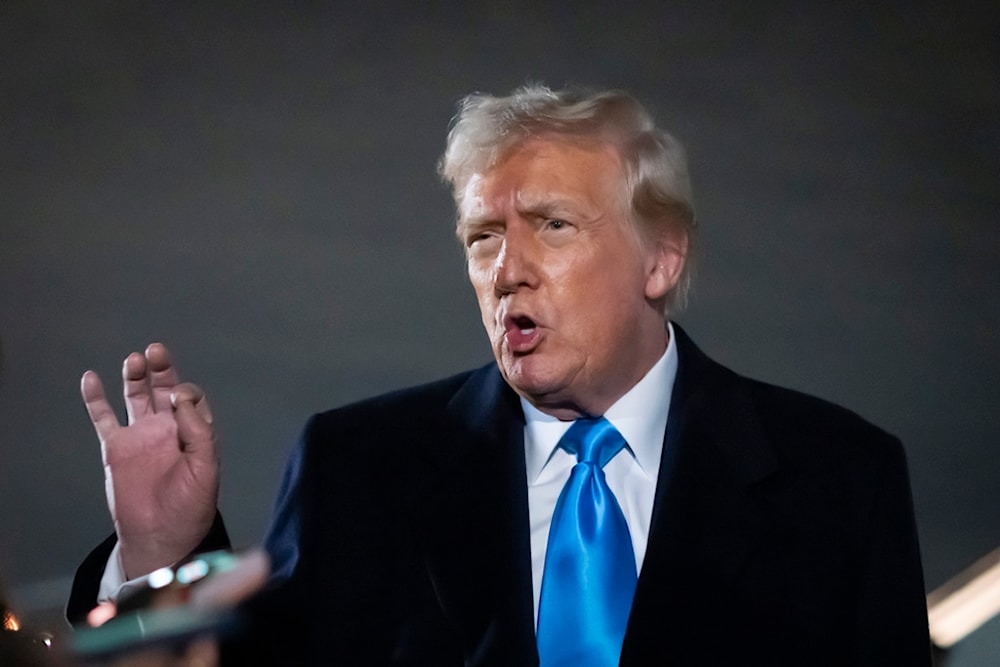Trump justifies tariffs on Canada, Mexico as anti-drug effort
White House National Economic Council Director Kevin Hassett insisted that the new tariffs against Canada and Mexico are not a trade war but a measure to combat drug smuggling.
-

President Donald Trump speaks to reporters next to Air Force One after arriving back at Joint Base Andrews, Md., Sunday, Feb. 2, 2025. (AP)
US President Donald Trump announced on Monday that he spoke with Canadian Prime Minister Justin Trudeau and intends to follow up with another conversation at 3:00 pm (20:00 GMT), just hours after imposing 25% tariffs on Canada—one of the United States' key trading partners.
"Just spoke to Justin Trudeau. Will be speaking to him again at 3:00 PM," Trump wrote on Truth Social.
In his statement, Trump accused Canada of blocking US banks from operating within its territory. He also framed the tariffs as part of a "drug war" aimed at curbing cross-border narcotics trafficking, particularly fentanyl.
Mexico cooperating, Canada misunderstands tariffs
White House National Economic Council Director Kevin Hassett insisted that the new tariffs against Canada and Mexico are not a trade war but a measure to combat drug smuggling. In an interview with CNBC, he pointed to fentanyl as a major concern, noting that 100,000 Americans died from the drug last year.
"The good news is that in our conversations over the weekend, one of the things we've noticed is that the Mexicans are very, very serious about doing what President [Donald] Trump said in the executive order, that is getting more aggressive, much, much more aggressive about the drug war," Hassett said.
However, Canada has taken a different stance, with Hassett claiming that Ottawa misinterpreted the tariffs as a trade war. "The Canadians appear to have misunderstood the plain language or the executive order, and they're interpreting it as a trade war," he stated.
Canada and Mexico respond with retaliation
In response to the tariffs, Canada announced it would file a complaint with the World Trade Organization (WTO) and seek recourse under the US-Mexico-Canada Agreement (USMCA), which Trump himself signed in 2018.
A Canadian official, speaking anonymously, said that the government considers the tariffs a violation of US trade commitments.
Meanwhile, Canadian Prime Minister Justin Trudeau called on citizens to boycott US goods, urging them to "choose products made right here in Canada."
Mexico is also preparing retaliatory tariffs. President Claudia Sheinbaum announced that Mexico would impose duties ranging from 5% to 20% on key US exports such as pork, cheese, fresh produce, steel, and aluminum.
Mexico's Economy Minister Marcelo Ebrard called the tariffs a "flagrant violation" of USMCA and vowed that Plan B is underway to defend Mexico's trade interests.
Read more: Mexico hits back at US tariffs as trade dispute escalates
The tariffs could significantly disrupt North American trade, particularly in industries such as automotive manufacturing, agriculture, and energy.
Canada and Mexico supply 70% of North America's light vehicles, and nearly 60% of US crude oil imports come from Canada. The new tariffs could raise energy prices, particularly in the Midwest, where refineries depend on Canadian imports.

 3 Min Read
3 Min Read










